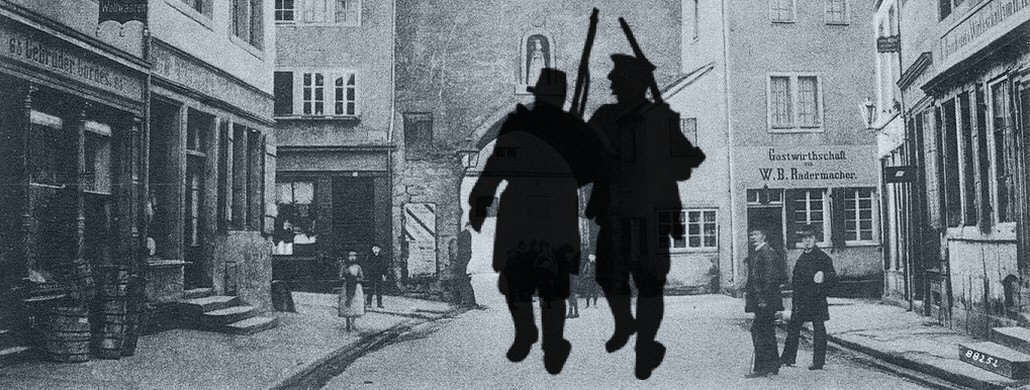
[Germany, July/August 1914] During the last few weeks, hectic diplomatic activity had been going on behind the scenes. Military leaders were secretly planning for a war. Yet, diplomacy failed.
Declarations of war
On July 23, Austria-Hungary sent an ultimatum to Serbia with such harsh terms as to make it almost impossible to accept. But Serbia accepted all conditions but one, and suggested submitting this issue to international arbitration. Yet, the war parties in Vienna and Berlin already had the upper hand. Only Hungary’s Prime Minister Count Tisza warned that a war against Serbia would escalate into a world war.
When Kaiser Wilhelm II came home from his cruise on July 27, he learned about Serbia’s answer, but only the next day. At once, he ordered his Foreign Office to tell Austria-Hungary that there was no longer any justification for war. Austria should be content with a temporary occupation of Belgrade to make sure Serbia kept her promises. But meanwhile, the German Foreign Office had given much encouragement to Austria’s Foreign Minister Berchthold. He had already obtained Emperor Franz Joseph’s authorization for war on July 27. On July 28, Austria-Hungary declared war on Serbia.
Within a week, Serbia, Russia, France, and Great Britain on one side, and Germany and Austria-Hungary on the other were at war. On August 1, 1914, Germany declared war on Russia, on August 3 on France. All over Europe, people believed that they had to defend their countries against their enemies.
Mobilization
Two million men were drafted at once. Many young men volunteered to the front, most of them convinced that they would defeat their enemies within a few months and be back for Christmas. The outbreak of the war had inspired a wave of patriotic feelings. Those who had endured wars themselves, like Emil Bergmann, did not share this enthusiasm for war. Emil knew the cruel reality and did not dare to imagine what modern weaponry such a U-boats, air plans, machine guns, rapid-fire field artillery and chemical weapons would do to thousands of people. Also in many working-class and peasant families fear and worries prevailed. What would become of them if the male family members would not return from war? And yet, they too would fight back tears when they bade farewell to their loved ones.
“Burgfrieden” – political truce
Like many others who feared war, Lottie had hoped that at least the Social Democrats in the Reichstag would vote against the war loans and thus stop the war machinery. But when the Kaiser’s government had credibly assured that Germany had to defend itself against Russia, the tide of public opinion had turned for war. The Social Democrats, who hated and feared the Russian Tsar more than the Kaiser, considered it their patriotic duty to join the war efforts. All the political parties agreed to a truce during the war (“Burgfrieden”). Consequently, all parties in the Reichstag, including the Social Democrats, voted for the war loans.
Rhine steamer “Aimée”
Susan’s family and Sophie’s brother Hans Limbach were also shaken. For years, their beloved Rhine steamer “Aimée” had been cruising the Rhine under German and Alsatian flag, bringing together people from both banks. Now, the French and the Germans would fire upon one another again. France would fight to regain Alsace-Lorraine, and Germany would fight to keep it. To accommodate the needs of wartime economy, the “Aimée” would probably be confiscated for military purposes, even if it was only to take her apart and use the material.
But Captain Boule-Piquelot had not given them his ship to have it used in a war – neither by the French nor by the Germans. They quickly agreed: early the next morning, Susan’s husband Étienne and Hans would take the “Aimée” up the Rhine to Alsace, and put her in the service of the Red Cross. Susan wanted to accompany them, but Étienne urged her to stay with their daughter Marie. At dawn the next day, Susan and Marie stood at the bank of the Rhine, waving good-bye to the “Aimée”.
Then they went home. Should something happen to us, turn to Joscha Csabany, he is a fine fellow, Étienne had said at farewell. When they arrived at the vineyard, Lottie came to meet them, she was deathly pale. The draft for her husband Matthias had come.
To the front
Bonn was a garrison town city, an infantry battalion of 9th Rheinisches Infanterie-Regiments 160 and a hussar corps had their barracks here. Many young mean hurried there and volunteered, much more than were needed.
Early in August, many families were standing on the platform of Bonn main station, bidding farewell to their loved ones. Among them were Lottie and her children Kathi und Walter. Train by train went in, took the soldiers on board and left for the front. One last hug for his wife and his children, then Matthias got on his train to the front.

Be the first to comment